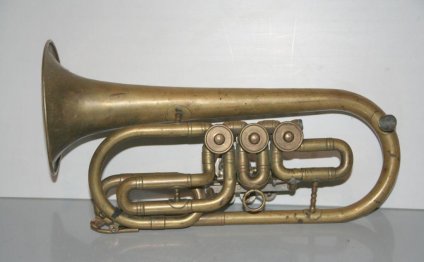
Cornet Musical Instrument
Corneth (ital. cornetto - " cornetto " ) or root-a-piston (French) cornet à pistons - " punctures " , a copper spiritual musical instrument that resembles a tube, but has a wider and shorter tube and equipped not with ventilation but with pistons. Behaves his origins from the mailbag. It was designed in France around 1830.
The actual cord sound matches the pipe range from (and small octave) to c3 (up to third octave). S-bemol (in B) and la (in A) shall be used, the notes shall normally be written without key signs, tone or 1.5 (depending on condition) above the actual sound.
In the nineteenth century, the roots were often placed in an orchestra along with pipes. Although the pipes were chromatic instruments, composers rarely trusted them with salt and virtuous episodes. It was considered that the root had greater virtuosity and more mild tamper than the pipe. On the other hand, his temple is only present in the first octave. In the low register, his tempbre is dark and malicious (like the temple of the English rose with a low clarinet) and his lower notes are easier on it than on the pipe. In the second octave, his tempbre is becoming increasingly screamy, glued with the shades of fanfarony. Cornets were used in Berlioz Orchestras (Garold in Italy) where his malicious obedience was used in the extreme registers, Bize (Arlesianca Drama music), Chaikovsky (Italian Cavcio, Francesca da Rimini, where his tempbs were emulated). One of the most famous coronet salt numbers is the Naapolitan dance from the Chaikov Lake Ballet now plays on the flugelhorne if there is a desire to underline the tenderness, or a simple tube, if you need to emphasize the glacier.
In the second half of the nineteenth century, the Cornet was very popular. In 1869, the Cornet class was opened in the Paris Conservatory, the founder and his first professor was Jean-Batist Arban's famous coronetist.
Share this Post
Related posts
Old Musical Instruments
#Hungary #Austria #Prussia #Inform_aphhungary classical musical lovers can enjoy a great game of musicians in the Budapest…
Read MoreClassical Musical Instruments
3,570 rubles. There s a Self-Governance. Buyers from Moscow, St. Petersburg and other cities will find a fairly wide range…
Read More









